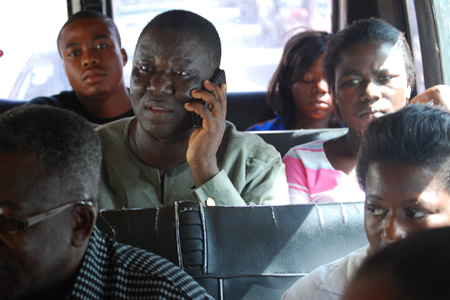In a country where public transport is seen as a curse of the hustling and the impoverished, the decision by some ministers of state and MPs to use public buses (popularly known as ‘trotros’), was as unusual as it is significant – at least for them. They said they wanted a first-hand experience of how the public transport system worked.
Deputy transport minister, Dzifa Attivor, told the BBC that parking her luxury sedan and opting for a ‘trotro’ ride gave her a few insights.
"We think it’s about time that the system was changed so we can have a dedicated bus lane so people can get to work on time," she said.
- Advertisement -
For Roads and Highways minister, Joe Gidisu, who parked his brand new land cruiser to pick a trotro from Madina, the experience was as good as new.
“After leaving the Ghana National Association of Teachers some 15 years ago I have not used public transport,” he says adding that the ‘trotro’ ride has made him realise that “we have a long way to go.”
We do, indeed. But we are not going to get to where we need to be if the so-called big men engage in one-day stunts like the one we recently witnessed. It’s all good to have a first-hand experience of how the system works. The nice words about how the gimmick will help in policy formulation are all well-noted. But if the ministers and MPs really want to solve the problem, they should resolve to use public transport for their daily commute – like most Ghanaians do.
I know this is too much to ask. One of the best ways to differentiate between the rich and poor is too look out in the morning for those who are using trotros or cabs and those who are riding in their own cars. So for most of our leaders being on public transport is not dignifying enough. It’s insulting.
Our public transport system, especially the trotro system, is not dignifying for all of us. Getting on board is always a struggle during the rush hour. People have to form long winding queues and wait for hours to get a seat. Since it’s impossible to tell when the next bus will arrive tempers are often flayed leading to a rather generous exchange of blows and insults. When one finally manages to get on board, there is very little legroom, a lot of dirt and grime and personal comfort on the bus is never guaranteed. The ride itself is often bumpy, sometimes even dangerous, as reckless drivers try to outrun each other with their ill-maintained, rickety vehicles and in doing so safety is often compromised.
This is the reality faced by hundreds of thousands of Ghanaians every day. It’s good that our leaders want to experience it. But that’s not enough. If the politicians think boarding a ‘trotro’ for a day will demonstrate to Ghanaians that they care, I am afraid they are mistaken. They know what the problem is – most of our politicians have at one time or another used the public transport system. So they should just go ahead and fix it – with wisdom and foresight. There should be no half-hearted, knee-jerk ‘initiatives’.
One of the best things the Kufuor administration almost (repeat: almost) did was the introduction of metro mass transit service, which now exists in all but name. The idea was ill-thought out (as usual) and the implementation was awful. As a result, have mass transit buses which operate just like trotros – unpredictable, uncomfortable, ill-maintained. Making the mass transit service functional and efficient will be a good way to start. If they work hard at it, seeing a minister of state aboard a public bus will not be such a major news event.


